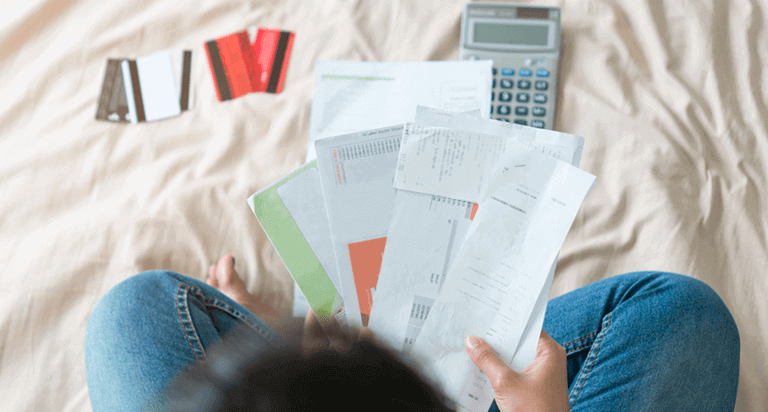Five Credit Mistakes to Avoid when Facing Economic Uncertainty


Highlights:
- In times of financial uncertainty, many look to credit cards to help get through.
- Small or short term specific needs are better candidates for use of credit cards.
- Longer or more uncertain financial situations should be discussed with your lenders, including credit card companies, to help offset additional risks or fees.
- Whenever possible, pay more than the credit card minimum payment on your credit cards to reduce interest payments and lower your debt.
- Don't cancel a credit card you're not using as it could affect your debt-to-credit ratio.
If you're one of many Americans facing financial setbacks due to personal or job related changes, your relationship with your credit accounts may have shifted. You may be using your credit cards more than normal, feeling stressed about making your monthly payments, making a late credit card payment, or worrying that an increased reliance on your cards will cause your credit scores to decline.
Be careful to avoid these five credit mistakes people may be making with their credit cards:
1. Failing to communicate with your lenders
In many cases, people who are struggling financially are afraid to reach out to their creditors and would rather figure out how to make ends meet on their own. Don't make these credit card mistakes. Many creditors offer relief options, to help make sure the debt is paid. When given prior notice, some credit card companies may allow you to defer or decrease your monthly payments for a period of time. They might also waive late fees for a late credit card payment or temporarily decrease your interest rate.
However, your lenders can only offer you these accommodations if you contact them before you miss a payment. They're unable to accommodate financial hardship retroactively, so it's important to reach out in advance and ask what relief options may be available to you.
2. Only making the minimum monthly payment if you can afford more
Generally, it's a good idea to pay more than the minimum on your credit card debt so long as you're able to afford it. If you only make the credit card minimum payment significantly more interest will build by carrying a balance on the credit card over time, increasing the length of your loan and the amount of money you'll end up spending. So if you're financially able, paying above the monthly minimum will help you get out of debt sooner and save money in the long run. You also want to be sure to make your payments on time. Your overall credit will be negatively impacted when there are late payments on your credit report.
3. Canceling your credit cards when you're no longer using them
You may think it's a good idea to cancel your credit card as a logical way to avoid temptation and prevent yourself from leaning too much on credit. However, two components of your credit history can be negatively affected by a sudden account closure.
First, is your credit utilization rate (also known as your debt-to-credit ratio), which is the amount of debt you currently carry divided by the total amount of credit you have available. Lenders like to see a relatively low utilization rate (typically no more than 30 percent), because it suggests that you'll pay back the money you borrow rather than max out your cards and rack up debt indefinitely. The total credit available to you is calculated across all of your credit cards and other revolving credit accounts. Therefore, closing a card suddenly could dramatically increase this ratio and have a negative impact on your credit scores. If possible, don't cancel credit cards, instead remove them from your wallet or cut them up to avoid using them.
Second, your credit scores also weigh the length of your credit history. If you have a long-held account that you close suddenly, even one you rarely use, you could significantly shorten the length of your credit history and impact your credit scores.
So long as you won't be tempted to make additional charges to cards you're trying not to use, it's generally better to leave the accounts open. If you don't want to be tempted to spend on accounts you've chosen not to use, consider putting the cards in a safe or safety deposit box along with other valuables.
4. Carrying a balance on your card from month to month if you can avoid it
It's a common misconception that carrying a balance on credit cards will improve your credit scores. In reality, the opposite is generally true. Going back to the credit utilization rate, it's a good idea to pay your balances in full each month in order to keep your debt-to-credit ratio low. In the process, you'll also avoid racking up interest charges.
5. Applying for new credit accounts too often
When you apply for a line of credit, the inquiry will show up on your credit reports. Multiple inquiries in a short period of time can be a red flag for lenders who see this activity as a warning sign that you're applying for credit that you won't have the money to pay back. In general, try to spread out your applications for new lines of credit.
Using your credit cards more frequently during challenging financial times doesn't have to mean something negative for your finances. By avoiding these and other common mistakes, you can feel more secure using your credit cards when you need them most, without threatening your credit history or severely impacting your credit scores.
Get your free credit score today!
We get it, credit scores are important. A monthly free credit score & Equifax credit report are available with Equifax Core CreditTM. No credit card required.



